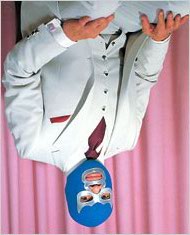
1987 science fiction action mayhem
Rating: 13/20
Plot: Some tough guys, led by Arnold Schwarzenegger, is tricked by Carl Weathers into venturing into the South American jungle to find captured soldiers. While there, a scary alien thing hunts them one by one and strips them of their skin. Apparently it's a hobby.
I wonder if I'm the only person who can't watch Carl Weathers in this without inserting the line "You got yourself a stew goin'" after everything that he says.
"We pick up their trail at the chopper, run 'em down, grab those hostages and bounce back across the border before anybody knows we were there. And you got yourself a stew goin'!"
"Goddamn jackpot. We finally got those bastards. We got 'em. And we've got ourselves a stew goin'!"
Arnold: "Bleed, bastard. Bleed."
Carl Weathers: "And you've got yourself a stew goin'!"
It's really amazing how many of the actors in this ended up with a political career. Everybody knows that Schwarzenegger became the governor of California, and almost everybody knows that Jesse "The Body" Ventura became governor of Minnesota. But did you know that Bill Duke (Mac) later became a congressman in New York? Or that Richard Chaves (Poncho) was a senator for seven and a half days before being ejected from his seat due to a sex scandal involving a mollusk? Sonny Landham (Billy) became the mayor of Sugar Tit, South Carolina, and R.G. Armstrong was elected the president of Belarus. The Predator himself, a guy named Kevin Peter Hall, could have retired after a terrifically versatile career playing a mutant bear, an alien, a monster, another alien, another monster, another mutant bear, a mutant alien, a mutant monster, a mutant, a regular bear, and Harry from
Harry and the Hendersons to become President of the United States, but he sadly passed away in the early 90s and never got the chance. This movie is pretty straightforward. You get exactly what you figured you'd get--a ton of explosions, some inexplicable; some stock characters; a fistful of Arnold one-liners ("Stick around."); action scenes piled on top of action scenes; some pretty good special effects; and a wafer-thin plot. Most of the movie looks like the director just said, "Hey, fellas, why don't you wander around the jungle here for a few hours. We'll film you and then pull out the best stuff to use in the movie." I do really like the jungle imagery in this. It's filmed really well. Some of the action sequences are fine; others make little-to-no sense. The Predator's look is cartoony whenever he's in his camouflage state but effectively menacing when he's not. The climactic fight scene between Arnold and the alien, a fight scene you know is going to happen before you pop the dvd in the machine, is actually kind of boring.
And I thought of a new movie idea, a screenplay I'm going to write and present to Arnold himself to get him back on the silver screen. The movie poster above actually inspired me because it almost looks like the movie is called
Schwarzenegger. My movie, titled
Schwarzenegger! (note the punctuation) will have Arnold playing himself with all the things and people he's ever beaten up or killed coming back to get their revenge. At the end of my movie (spoiler alert!), Sinbad is going to kill him. How badass is that going to be?
 1962 pelicula de lucha libre
1962 pelicula de lucha libre



































